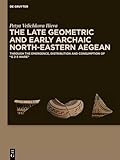The Late Geometric and Early Archaic North-Eastern Aegean : Through the Emergence, Distribution and Consumption of ‘G 2-3 Ware’ / Petya Velichkova Ilieva.
Material type: TextPublisher: Berlin ; Boston : De Gruyter, [2023]Copyright date: ©2024Description: 1 online resource (VI, 193 p.)Content type:
TextPublisher: Berlin ; Boston : De Gruyter, [2023]Copyright date: ©2024Description: 1 online resource (VI, 193 p.)Content type: - 9783111289939
- 9783111314815
- 9783111314556
- 738.0938 23/eng/20240220
- NK3835 .I45 2024
- online - DeGruyter
- Issued also in print.
| Item type | Current library | Call number | URL | Status | Notes | Barcode | |
|---|---|---|---|---|---|---|---|
 eBook
eBook
|
Biblioteca "Angelicum" Pont. Univ. S.Tommaso d'Aquino Nuvola online | online - DeGruyter (Browse shelf(Opens below)) | Online access | Not for loan (Accesso limitato) | Accesso per gli utenti autorizzati / Access for authorized users | (dgr)9783111314556 |
Frontmatter -- Preface and Acknowledgements -- Contents -- List of Illustrations -- List of Abbreviations -- Chapter 1 Introduction and History of Research -- Chapter 2 Recognising G 2-3 Ware: Technological Features and Ornamental System -- Chapter 3 Repertory of Shapes -- Chapter 4 Centres of Manufacture and Distribution Patterns. The Question of Origin -- Chapter 5 Chronology -- Chapter 6 Introduction, Adoption and Consumption of G 2-3 Ware by Northern Aegean Communities: A Contextual Approach -- Chapter 7 The Late Geometric and Early Archaic Northern Aegean: A Ceramic Perspective -- Appendix μ-XRF Fluorescence Spectroscopy -- Bibliography -- Index of Place Names -- Plates
restricted access online access with authorization star
http://purl.org/coar/access_right/c_16ec
The book focuses on the archaeology of the Late Geometric and Early Archaic North-Eastern Aegean through the emergence, manufacture, distribution and consumption of a regional pottery group known as G 2-3 Ware. It offers the first comprehensive, in-depth study through combination of scientific (fabric analysis) and traditional (morphological, stylistic, comparative and distribution analysis) methods. The large body of studied material allows for drawing conclusions on a broader geographical and historical scale, in contrast to earlier studies focused on individual sites. The manufacture, distribution and consumption patterns are characterised by diversity, which reflects a dynamic, multiethnic communication network developed in the Northern Aegean basin in the late 8th and the 7th c. BC. The adoption of G 2-3 Ware by local, Thracian coastal communities is discussed in the light of transfer of knowledge and social practices. It is argued that the G 2-3 Ware potters were aware of earlier and contemporaneous ceramic developments in southern Greece and Anatolia and created a blend of pottery features specific for each one of these areas. The study deconstructs the forged link between G 2-3 Ware and the Greek colonisation in the area, by linking it to a local, pre-colonial development.
Issued also in print.
Mode of access: Internet via World Wide Web.
In English.
Description based on online resource; title from PDF title page (publisher's Web site, viewed 02. Jun 2024)


